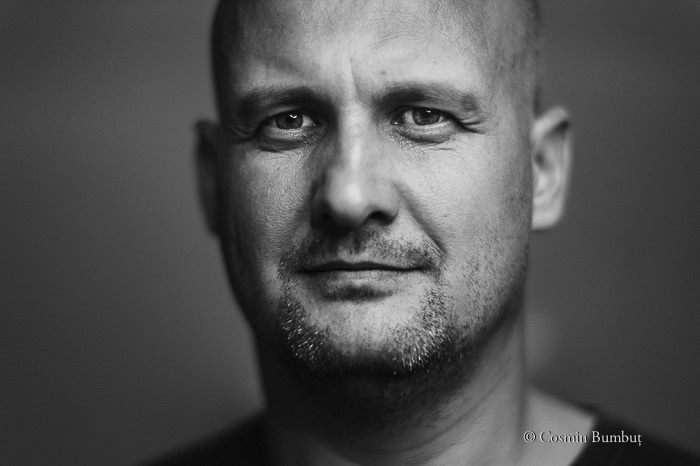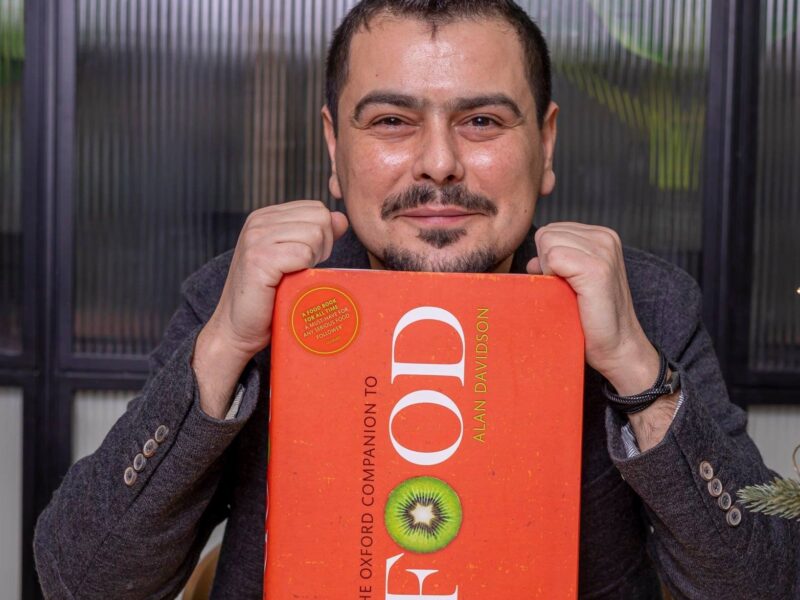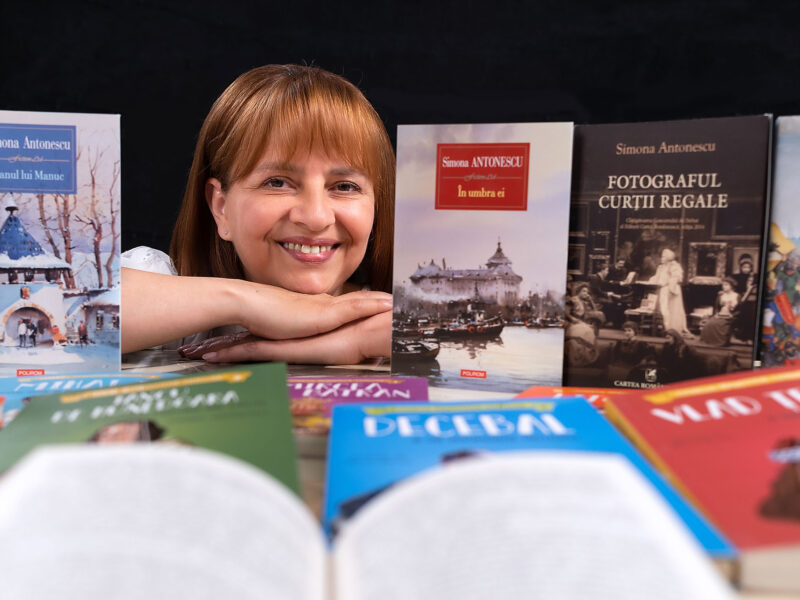Mihail Vakulovski is a writer, a translator and a bookseller at Humanitas Book Store in Brașov. He founded Tiuk! magazine and CenaKLUb Tiuk. He was editor-in-chief at Zile și Nopți and at Aula Publishing House. He published many books of poetry, novels, plays, literary criticism and interviews. His latest novel, Tata mă citește și după moarte, is published by Humanitas Publishing House. He is an active supporter of Romanian contemporary literature and a recorder of involuntary book sore humour.
You said on Facebook that Vladimir Sorokin and Victor Pelevin, in that respective order, are the gods of contemporary Russian literature. But who is the god of literature, period? We couldn't start talking about the book industry without talking about books and writers, so I'm going to ask you what is the coolest book in your view. Or maybe from the ones read lately.
This is how I started the preface to the book Dimineața lunetistului [short stories collection] by Vladimir Sorokin, which I translated in 2003 with my brother, Alexandru Vakulovski: “Vladimir Sorokin is one of the most popular contemporary Russian writers, alongside with Victor Erofeev and Victor Pelevin, with which he is very often compared, even in bookstores their books being always adjoining. Dimineața lunetistului [short stories collection], his volume of short stories, is his most important book to date, although novels such as Four Stout Hearts or Marina’s Thirtieth Love have topped all the charts, and Blue Salo is a book more well known, more publicized, more commented about and, therefore, much better sold, being considered by many people a scandalous book, bestseller burned - literally - in the Red Square by communists and in front of the Grand Theater by the members of Those Who Go Together, the organization of young writers supported by Vladimir Putin, the president of Russia, "brothers of arms" with whom he was judged in the matter of copyright, a trial eventually lost by Sorokin and the publishing house where he publishes his writings , Ad Marginem.
Dimineața lunetistului [short stories collection] is Vladimir Sorokin's first book translated into Romanian, even if this writer, like Pelevin or Mamleev (still unknown to Romanian readers), are widely read prose writers. In Germany only there are more than 30 PhD thesis on the work of this great author, who is only 49 years old. In fact, Vladimir Sorokin was first published in the West and only after he had already become well known across the world he began to be published in his country, as was once the case with the American Henry Miller...”.
Sorokin, Victor Erofeev and Pelevin are the best contemporary Russian writers, who were greatly influenced by Venedikt Erofeev and Yuri Mamleev. And the father of all is the avant-garde Daniil Harms, who has always used the biography and work of the greatest Russian writers of all time in his texts - Dostoevsky, Tolstoy, Gogol and Pushkin. That’s how it is with the deities from the Russian literature, very briefly.
I don't like to make tops, but let's get into the game: the god of literature (and so on) can be considered, without hesitation, the popular genius who has created the popular ballads and medieval legends that will never disappear, Homer or Dante. It depends on a lot of details, if you had asked me as a teenager about the gods of literature, I would probably have answered you: E.A. Poe, Baudelaire, Salinger, Gabriel García Márquez. In my youth - Daniil Harms, Urmuz, Rimbaud, Blaga, Kuprin, Henry Miller. Then Ion Creangă, Eugène Ionesco, Sorokin, Sabato, Houellebecq, Cristian Popescu, Constantin Acosmei, Matei Vişniec, Aglaja Veteranyi…
It's hard to say who is the best writer in our village, but the "god" is - obviously, unanimously accepted - my father, Alexei Vakulovski, the author of the bestseller Children of Hunger, who taught & influenced us all and that’s something that any writer from our village would say.
You’ve been a bookseller at the Humanitas Bookstore in Brașov for 7 years. Could you tell me, please, what this job actually entails?
I ended up working at the bookstore by accident. The economic crisis had begun and the owners of Zile şi NopţiNights magazine, where I had worked the same way for about seven or eight years, did what they knew to save the company - they greatly reduced our salaries and cut our benefits and rights overnight, so I preferred to leave. For a year I’ve lived from translations, I’ve been very fortunate to receive very good offers and I translated three anthologies by Daniil Harms, The Pathologies by Zakhar Prilepin and Blowing Up Russia: Terror from Within by Aleksander Litvinenko and Yuri Felistinsky. But translating is not only very pleasant and beautiful (if you translate what you like), but also very demanding. When you translate others you can't write your own literature, then the translation sucks all your energy, it exhausts you. So when my friend, the writer Vlad Drăgoi asked me if I’d like to be part of their fine team at the Humanitas Brașov Bookstore, I accepted the challenge and went to the first job interview of my life. I told myself I would see how it’s going, that I’d resist for three months, the length of the first contract, after that - we'll see.
Ce face un librar? Depinde şi de librărie, la Humanitas fiecare librar trebuie să ştie să facă absolut totul ce trebuie făcut într-o librărie. Primim „marfă” în fiecare vineri, la ora 07:00, vine de la Bucureşti maşina cu cărţi, o descărcăm (uneori pe ploi torenţiale, de la parcarea de lîngă maternitate, la vreun km jumătate de librărie) şi le cărăm în depozit, de unde le preluăm. Ca să deschizi poarta trebuie să ştii codul (după ce-o deschizi – stingi lumina din faţa librăriei, pe care o aprinzi seara, cînd pleci), ca să deschizi uşa din spate – alt cod, dezarmezi alarma pe care o armezi seara, fiecare computer are codul lui, programul de vînzare – altă parolă, camerele – alt cod, e-mailul, programul de căutare – fiecare are, la fel, altă parolă. Aprinzi luminile din librărie, în toate camerele, stingi lumina care luminează noaptea sigla de afară. După ce etichetăm cărţile şi le bipăm, le scoatem pe scările dintre depozit şi săli, de pe scări le ducem în librărie, la rafturile lor (autorii Humanitas la raftul Autori Humanitas, filozofia la Filozofie, poezia la Poezie şi tot aşa…), rafturi care trebuie să fie frumos aranjate, pe colecţii, cîte două exemplare, bestsellerurile şi noutăţile – la copertă, restul – la cotor. La casă – vinzi, faci comenzile din programul de comenzi, Sirius (în fiecare zi – alte edituri), comenzile din programul de noutăţi, de pe mail, faci transferurile cerute de alte librării din lanţ, răspunzi la telefoane, eşti la dispoziţia clienţilor, faci postări pe pagina de facebook a librăriei, răspunzi la întrebările clienţilor din librărie, de pe facebook, de pe mail, ai camerele video de supraveghere deschise, dacă e cineva dubios în librărie îl urmăreşti pe camere, dacă eşti mai liber – ai cărţi de aranjat la rafturile devastate de clienţi, fie copii, fie maturi (cele mai vraişte rafturi de obicei sînt alea pentru copii şi raftul de Drept, dar şi ăla de Istorie e atacat frecvent). Dacă ai lansare în librărie – o pregăteşti, scoţi scaunele, le aranjezi în Sala Mare, masa, afişul e pus în geam cu vreo săptămînă înainte, faci pagina evenimentului pe pagina de facebook, pregăteşti microfoanele etc. Dacă ai vreo lansare undeva în oraş, cari şi cărţile (mai multe decît crezi c-o să se vîndă), dacă nu se vînd – le cari şi înapoi. La ora de închidere – încui uşa (la care – după închidere – mereu apar oameni supăraţi că s-a închis), completezi raportul de casă şi registrul, numeri banii (pe care a doua zi îi retragi din sistem şi-i duci la bancă), dacă-s în minus – pui diferenţa din propriul buzunar, dacă ai greşit şi cu un ban pe card – completezi un protocol şi explici ce s-a întîmplat. Trimiţi raportul la sediul central (dacă ai şi protocol, Doamne fere! – ataşezi şi protocolul, dacă s-a plătit şi cu tichete cadou sau vouchere, ataşezi şi documentul de tichete cadou sau vouchere). Stingi luminile, codezi alarmele, încui uşile, aprinzi luminile de afară, codezi şi ultima alarmă, încui, e deja tîrziu, te duci acasă şi încerci să te odihneşti pentru ziua de mîine, care va fi cam la fel, doar clienţii pot fi alţii. Şi faci multe altele, de care nu ai habar la început – iarna cureţi zăpada din faţa librăriei, mai faci şi retururi, cînd se schimbă coordonatorul faci inventarul două zile, în prima se scanează absolut totul din librărie, a doua zi se verifică dacă lipsurile sînt reale sau s-a greşit la scanare. Am încercat să fiu cît mai succint…
You recommended to Răzvan Exarhu on his morning broadcast from RockFM the book of Shaun Bythell's, The Diary of a Book Seller. Do you share the same distrust regarding the idyllic vision of the profession that Bythell and George Orwell, present in the mottos of the book published by Anansi (Trei Publishing Group)?
Only those who’ve never worked in a bookstore can have an idyllic vision of working in a bookstore. I had colleagues (already employed) who resisted in the bookstore for only a few hours, a day, a week, many left after a month, many left after the first contract (of three months), despite the fact that they really liked what they were doing and the team that they were in.
I wholeheartedly recommend Shaun Bythell's The Diary of a Book Seller - a very well written book with humor, irony, skill, knowledge, intelligence, read with great pleasure and you will learn quite a lot about the profession of a bookseller (about which you’ll soon realize that you had little idea), but also about books and people in general. For me, the best discovery when reading The Diary of a Book Seller is that I always recognize in the characters and stories told by Shaun Bythell characters & situations under the Tîmpa Mountain, you just have to change their name (John in Ion, Amazon in Elephant…). Yes, Shaun Bythell took all mottos of his super book from George Orwell's Bookshop Memories . After reading The Diary of a Book Seller I’ve looked everywhere for Orwell's text, which was nowhere to be found. But then Polirom published again Orwell's essays book, Books v. Cigarettes , (I had a colleague at the bookstore who quit smoking, and the money that she’d use to buy cigarettes she now spent on books!), in which there’s the essay on the memories of the time when he was an antiquarian too. The passages quoted by Bythell are in their right place, of course, but the essay is far too short, incomparable to Bythell's book.
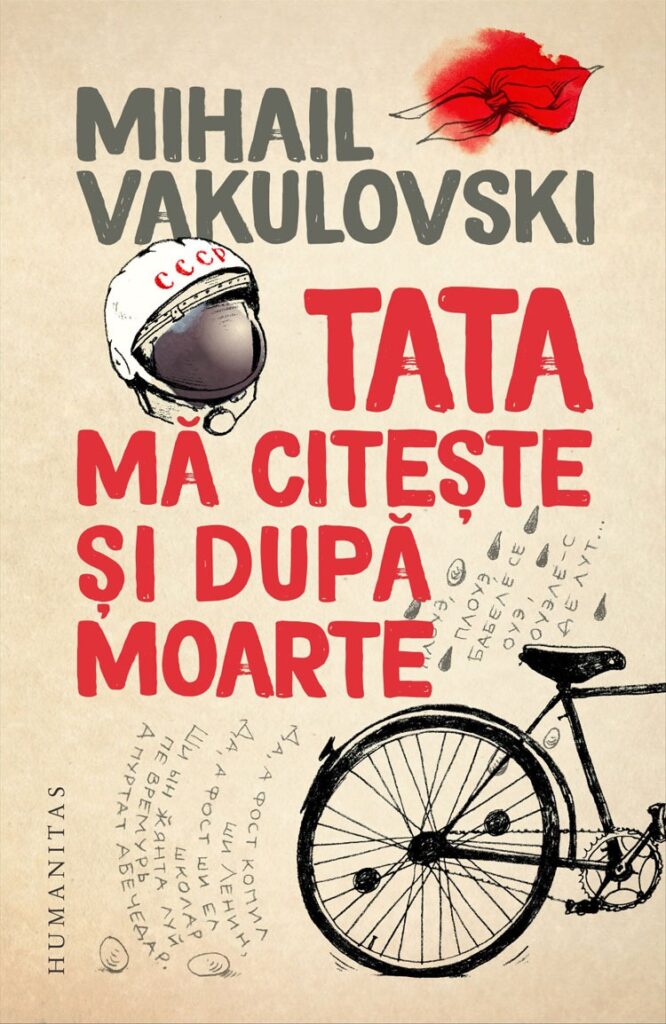
In 2018 you received the Bookseller of the Year Award at the International Poetry and Music Festival "Poetry is in Bistrita". What should someone interested in applying for this award do? What does a good bookseller actually do?
You cannot apply for this award. You can only wake up the Bookseller of the Year and that's it. The criteria according to which the winner is chosen are known only by the festival organizers, Dan Coman, Marin Mălaicu-Hondrari and Gavril Ţărmure, whom I thank once again for their trust (the ones who had won before me were Valentin Derevlean from the University Librarium and Book Corner Librarium Cluj and the two owls from Timișoara - Oana Doboşi & Raluca Selejan!). People went to the bookstore, they’ve watched what I’ve done on the bookstore’s Facebook page, but also on mine, Mr. Ţărmure has a sister-in-law who lives in Braşov and she’s a permanent client of our bookstore, I also launched a book for Marin at CenaKLUb Tiuk, which I have been doing for several years at Humanitas Brașov Bookstore, maybe they had other spies, I have no idea why they chose me that year. When they announced me, a few days before the start of the festival, that I was the winner of the award, I asked them what it meant (and what did I do for it) and they told me that the most important thing for them is how contemporary Romanian Literature is promoted. If that's the first criterion - I definitely deserved the award!
Have you felt the burden of the 2018 award? Do you know how the winners of the Miss pageants commit themselves to eradicating hunger, helping dolphins, afforesting risk areas? Did you have to resurrect forgotten writers, sell inexhaustible prints, convince people that they could learn to play the piano by reading The Pianist? Kidding. Did more people come to you for advice, did you find it easier to convince others to buy certain books?
I thought I would take the diploma - a real painting - to the bookstore (any prize belongs first and foremost to the team - in football, theater, anywhere), but when I saw that no one even said, not even jokingly, "Congratulations, Bookseller of the Year!", neither my colleagues from Brașov, nor my bosses from Bucharest, I left the painting at home and I behaved as if nothing special had happened as well. Of course, I still recommended the books I liked and I tried to find the ones I disliked as soon as possible (I don't have fun - evilly - at the expense of those who buy them, but I'm glad we're getting rid of them, we clean the bookcase as it comes).
And here is how the piano incident took place, which was witnessed by a friend who’s a writer, a former colleague, who was left speechless:
“Do you have The Pianist? I found just one copy.” “We do. How many copies do you want?” “More! And I want them foil wrapped! And with a CD!” “Well, Humanitas books aren't wrapped in foil. And with CDs, you may want audiobooks.” “Buuuuuut, I want The Pianiiiist, that’s what I want you to give me!” “This is the book, you can get as many copies as you want.” “Yeah, what's this?” “It's a novel, the novel after which the film was made.” “Well, I want to learn to play the piano, can I learn that from it?” He leaves and returns after 5 minutes: “Actually, I came for The Art of War, do you have it?” “Yes, this one is a very nice edition.” “Yes, I want it! But can I think a little bit more?” “Of course you can.”
He leaves it on the children’s books shelf, leaves. #LibrărieCuUșileDeschise
Going back perhaps to an idea suggested above, in this generalized fear that digital will take over everything, that businesses like bookstore will lose the war with online retailers, what do you think are the strengths of your job? What can a bookseller do more than the interface of an online bookstore?
For me, the best thing is that I work with people like me, with books, in a beautiful place, in the center of the city, in a building from 1500, with drawings and paintings on the walls from 1510 (The Best Place in the World is Right Here is a Humanitas Fiction title that suits us a bit), that I see absolutely all the new appearances, most of the time before the authors of the books themselves, that I generally work with people who are looking for these books, people who read. For them - the important thing is that we have these books in the bookstore, that we open daily especially for them, that they can see the books before deciding whether to take them home or not, they can browse them, they can read from them, they can find out if they like the author's style, if they’re interested in the topic, if they don't like the translation or if the paper is newspaper or book paper, if the letters are big enough or if they aren't too big. They can consult with a bookseller, they can ask for recommendations; they can share impressions about what they read before, what they liked more. I also make a cenacle at the bookstore, CenaKLUb Tiuk, to which I invite only very good writers, readers can ask them questions, talk to them, ask for autographs. I don't think the physical book will ever disappear, audiobooks and eBooks have been around for a long time, but traditional books are still the most sought after.
You recommend books and writers on your Facebook page almost every day, you promote new titles, and you promote the more or less famous readers who enter the bookstore too. How much does this have to do with the job itself or how much of it is a reader instinct, so to speak. Is the passion for reading a must for the bookseller profession?
What I do on my Facebook page has nothing to do with the fact that I’m now a bookseller, even if I post many recommendations of books and literary events, what I do I do first and foremost on the Facebook page of the bookstore, but it's good for the bookstore, of course. Now we’re five booksellers at Humanitas Brașov and I post about 99% of the messages on the bookstore’s page (and all my colleagues are encouraged to post, it's not like anyone has a ban in this regard), so it's clear that I find pleasure in presenting the latest news, readers, writers, wishing them Happy Birthday, announcing events, awards, promotions…
What are the less pleasant moments in the bookseller activity? As we saw from the #LibrărieCuUșileDeschise collection, you manage to turn around with humor even the strangest experiences.
The bookstore being in Piața Sfatului, usually having the door open, not only people interested in books enter. Some of them feel like they are at the market, so they say on the phone: "I'm at the market" or "at the library". Some enter simply because they see an open door, to cool in the summer, to warm up in the winter, until the friend with whom they met "in the market" comes. For them, I have the column #CeSeMaiCautăLaLibrărie, they’re looking for everything - mici, condoms, draught beer, hammers, cigarettes... The inventories are also very tiring, when you scan all day, tiu-tiu-tiu-tiu-tiu-tiu-tiu-tiu eight hours without interruption, then another eight hours check if the missing books were really stolen or not scanned well. But the most awful are the days when we also sell tickets for Cerbul de Aur - many of the people who come for tickets for this festival enter a bookstore for the first and last time in their lives and this can be seen from the moon!
What about the most beautiful ones?
For me, the most beautiful moments from the bookstore are when the new appearances come, I can't wait to browse them or to buy them and read them. Or when we’re visited by nice people or friends who are writers or artists, or when we make launches with good friends on both sides of the stage, but it’s very pleasant to discover cool people you only knew as writers, we made some really extraordinary discoveries. I like it to the maximum when I meet nice people or funny and clever children or nice old people. I have a few favorite clients, people I care about now, but I didn't know before I worked at the bookstore. Even in the first days at the bookstore, an older woman said to me: “My husband and children will argue with me that I bought books again, but this is the last pleasure I have left.” And a very little girl confessed to me that she’s terrified because… she read what fear is. I also noted down our dialogue: “I am very scared, very, very scared. Before, I wasn't afraid to stay in the dark at night, and now I'm dying of fear.” “Well why?” “I do not know.” “There's nothing to be afraid of.” “I know, that's what my mother told me, I didn't even know what fear was before.” “And how did you find out?” “I heard the word, I went on the internet and did researches…”
The bookstore is located in Piața Sfatului in Brașov, a hot-spot of Romanian or foreign tourists. In terms of this category of audience, are there certain marketing practices that you need to consider, certain areas of books that you exploit? What are the most sought books by tourists?
Yes, we used to have the postcards outside, but until the last inventory, when we discovered that about 3000 of them had been stolen, we still had a beautiful wooden "cart" outside, in which we collected very cheap books, up to 10 lei, of which I found out that more than half were stolen too. We keep the door open and that's how everyone enters, many are scared immediately after they cross our threshold, that there are "only books here". We keep right at the entrance, on the shelves immediately on the right, maps and tourist materials, brochures and booklets about what tourists can see in the city, postcards, calendars, albums with Brașov, books in foreign languages, and on the left shelves - books on personal development, dictionaries, then children's books - that's marketing. And on the table in front of the door - the books and promotions of the month.
Tourists are looking for maps of the city, brochures with what they can see in Brașov, what they can visit, books in their language (mostly - Drakula or Romanian writers translated in their language or English), hats, T-shirts (if it's sunny), umbrellas if it rains - and in Brașov it rains almost all the time), albums with Brașov, CDs with folklore music, The Little Prince. It's a real trend, many tourists collect The Little Prince in the language of the country they visit (imagine that, to have a shelf at home only with The Little Prince - in all the languages of the world!). Only one took - especially for this collection - another book, 100 Years of Solitude. A couple of elders asked about In Europe's Shadow: Two Cold Wars and a Thirty-Year Journey Through Romania and Beyond by Robert D. Kaplan, in Romanian; they were Americans and they decided to visit us after reading this book.
Because we’re on this subject, have you met foreign tourists interested in Romanian literature?
Yes, those who want books, but not Drakula, usually ask about books of Romanian writers in English or any history book. The most popular is A Brief Illustrated History of Romanians by Neagu Djuvara (Humanitas). Romanian gastronomy books in English are often sought after too.
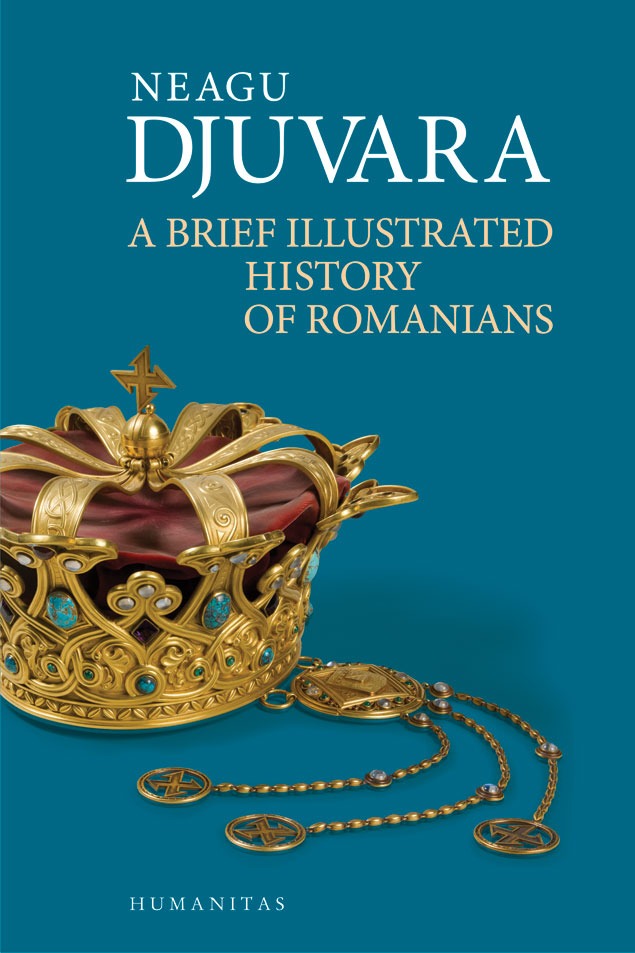
Speaking of Romanian literature, I discovered you, during college, as a meta-literature writer, the moment I was amazed to see how nice you can write about the poetry of the 80’s, reading the texts, reading what was written about the texts, but talking to the writers themselves and doing it so naturally and without emphasis. Then I found your fiction and poetry books. Since this site focuses on the book as an object and what revolves around it, I would like to ask you how you got started. How did you get to Arc Publishing House and how was the actual publishing process.
I debuted in at the Arc Publishing House in 1997, back then the best and most prestigious publishing house in the Republic of Moldova. Director: Eugen Lungu, editor-in-chief: Emilian Galaicu-Păun. It was very difficult to publish at that time, so I participated to their debut contest, "Prima Verba", a collection in which Ştefan Baştovoi and Iulian Ciocan had also debuted before. I won the contest for the poetry manuscript Nemuritor în păpuşoi, which won the Soros Prize and my book was published (print run from which I was given 1000 copies!), and won the Writers' Union Award for Debut. It was a rather large manuscript and Eugen Lungu told me that he would publish it without any problem as it is, after all that manuscript won the competition, but he advises me to reduce it, that people avoid reading such thick volumes especially of debutants’. He later told me that he expected me to ignore him (I was known as a fighting, direct, proud literary critic), but that with me he had worked the easiest - I listened to him and brought a completely different manuscript for publication, I had taken out more than half and worked on the texts that won the competition, I arranged them differently, I gave them a different title, Alexandru Muşina also wrote the preface for me, they made a beautiful cover and a wonderful photo, I worked very well with the editor of the book, Gheorghe Chiriţă, everything was really professional with Nemuritor în păpuşoi.
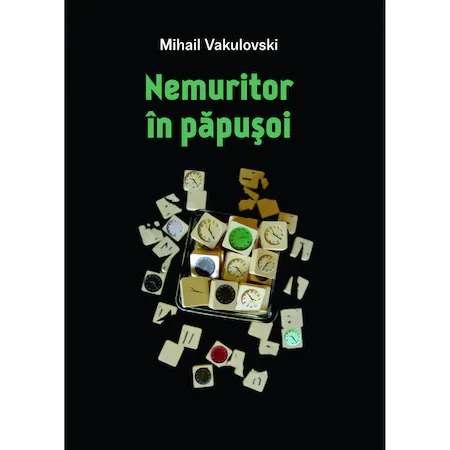
You later diversified the genres, but also the publishing houses, collaborating with many during the course of time. How are these collaborations negotiated and how do you make the transition from one to another?
I was lucky as far as publishers went, both as a translator and as a writer. After I started, I published at the publishing houses that requested my manuscripts; I didn’t find myself in the position to look for publishing houses for my manuscripts. After Arc, I published a monography at Aula Publishing House, patronized by the writer Alexandru Muşina, who had written my preface to the debut book and which I helped with the collections from his publishing house, Aula, even if I was in Bucharest and he in Braşov. Then I published at the Biblioteca de Poezie [Poetry Library], which was my friend’s Cristian Cosma, then known as un cristian. Then I published plays and poetry at Vinea Publishing House, at that moment the best poetry publishing house. I published at Polirom - through IRIR / Romanian Institute of Recent History, where I worked - a book of interviews with Holocaust survivors. At Pontica Publishing House I published at the request of Marin Mincu, at Biblioteca Stare de Urgență and and Biblioteca Revistei la Plic - thanks to my brother, at Tracus Arte - thanks to Ioan Cristescu and Cosmin Perţa, at Cartea Românească / Polirom - by the goodwill of Mădălina Ghiu. Then I published several books at a new publishing house, Ratio et Revelatio, founded by two kind-hearted young people who studied abroad and had just returned to Romania. At Humanitas I published in the collection curated and coordinated by Andreea Răsuceanu, "Scriitori români contemporani" [Contemporary Romanian Authors]. And the publishing house where I publish most often is Casa de Pariuri Literare, because it belongs to Cristian Cosma, with whom I’ve always been friend and who edited for me (let me count them, only these from CDPL, not the underground ones ) nine books - poetry, prose, interviews and a Tiuk! Anthology.
Was the fact that you published at several publishing houses an advantage? Maybe by reaching different audience segments or by the connections you could make?
I only published with friends or people who asked for or accepted my manuscripts, so all the editorial experiences were beautiful for me. Now, I hope publishers have enjoyed publishing my books as well. I don't care about books that needed an extension or new editions; anyway, every book has its own fate after publication.
Because we’re talking about your books, I will take over a question you asked Simona Popescu a long time ago, actually paraphrasing a question launched by her in another context. What kinds of thoughts are not allowed in your books? Are there limits you can't cross?
When I asked this I was convinced that there must be no limit in art, that everything is allowed, that freedom of expression in literature must be absolute, without any self-censorship.
To go further with the question from above. Has it ever happened to you that an editor or a copy editor wouldn’t come to terms with thoughts you still wanted to get into the books and wouldn’t let go until you’d take them out?
I don't think so. I don't remember anything like that ever happening to me.
You’re also a translator from Russian and therefore you have contact with the publishers from another perspective. Is the relationship you have with publishers as a translator different from that as an author?
As a translator, everything is simpler. You translate the book, you hand it over, you receive the fee (which is SF as an author, not just a dream) and the book comes out as soon as possible, because you translate with a contract, at the publisher's request, you don't translate in vain, from your own initiative, without ©.
You write, translate, organize (in times when no pandemic is going on) literary events, you are a bookseller. What are the situations in which you feel most comfortable?
I would like to live in a world where writers can live from writing (rhymes with "vis"-> paradis).
And which ones bring you the greatest satisfaction?
Literature brings me the greatest joys. You go through a state of satisfaction and joy even after you finish a translation, but it can’t compare to writing. The writing process brings you great pleasure, while the translation tires you and takes all your energy. After all, writing is a hobby, translation is work.
If you were to make a perfect combo between music and books, what gods should join forces?
When I write or read I don't need music, but peace, and let's say “nature sounds”. (Translated into English by Silvia Codescu)

